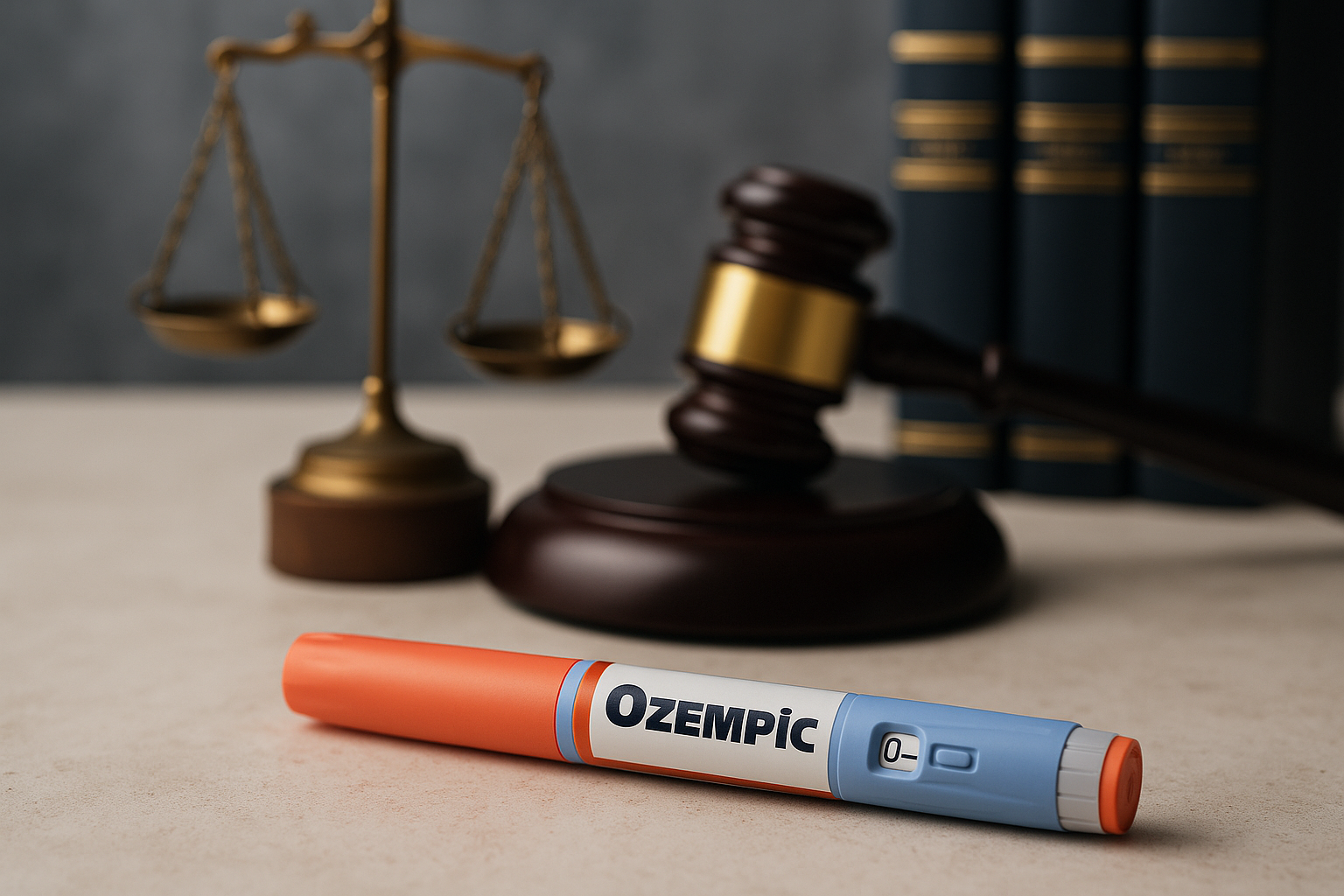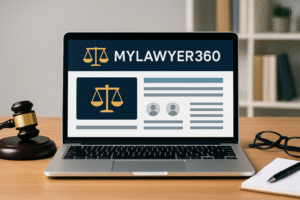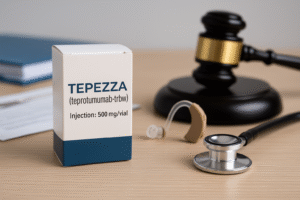Thousand of lawsuit now target the maker of Ozempic and other GLP-1 drug. These include Wegovy Rybelsus Trulicity and Mounjaro. Patients from across the country are filing claim. Each case tell a similar story. People took the drug as prescribed. They trusted it. Then they developed severe health problem.
Many now suffer from gastroparesis a condition where the stomach no longer digest food properly. Other have experienced NAION a sudden loss of vision that often cannot be reversed. Some ended up in emergency room. Some now live with permanent damage.
These lawsuit do not allege that Ozempic should never have been sold. Instead they focus on one serious failure. Drug companies did not warn patient or doctor about the full risk. The label were vague. The marketing was aggressive. Safety information was hidden or watered down.
People made medical decision without knowing the danger. That lack of warning is what fuel the lawsuits today.
What Is Ozempic?
Ozempic is a prescription drug used to treat type 2 diabete. It help lower blood sugar by copying a natural hormone in the body. That hormone is called GLP-1. It control insulin and slow how fast the stomach empties.
Doctor also prescribe Ozempic for weight loss. The drug helps people feel full sooner. That leads to fewer calories and gradual weight reduction. Many people without diabetes now use it to manage their weight.
Novo Nordisk make Ozempic. The FDA approved it in 2017. In 2021 the FDA approved Wegovy a higher dose version designed for obesity. Both drug use the same ingredient semaglutide.
These drug became popular fast. They were praised in media on social platform and in ads. Sale soared. Then reports of serious side effects started to grow. Now both Ozempic and Wegovy are central to lawsuit across the country.
Why Are People Suing?
Patients say they were not warned. Many now suffer from gastroparesis or NAION. These are not mild side effects. These are life changing condition.
Ozempic label mention nausea vomiting and constipation. They do not mention gastroparesis. They do not say anything about NAION, which causes sudden blindness.
Doctors also missed the signs. The drug’s official safety information gave no clear warning. That silence led to serious harm.
MDL 3094: The National Case
Courts have grouped the lawsuits into one large action. This is called MDL No. 3094. It sits in the Eastern District of Pennsylvania.
As of June 2025, there are 1,882 active cases. The number is rising fast. Most claims involve gastrointestinal injuries. Others involve sudden vision loss.
The MDL makes the process faster. It allows one judge to handle key decisions. It also puts pressure on the drug companies.
Gastroparesis: A Silent Trap
Gastroparesis is a serious stomach condition. It blocks the normal movement of food. Instead of passing through the stomach, food sits there. This delay leads to constant discomfort.
People with gastroparesis often feel full after just a few bite. Then come wave of nausea bloating and stomach pain. Vomiting is common. Some even throw up undigested food hours after eating.
Many patients end up in the emergency room. Some need IV fluids to treat dehydration. Others lose weight fast and struggle to get enough nutrition. Daily life becomes a battle. There is no cure. Only limited treatments exist, and none work for everyone.
Doctors often miss the diagnosis. The symptoms mimic other problems like acid reflux or IBS. Many patients go from one specialist to another. They hear guesses but no answers. During this time, their condition often gets worse.
People trusted Ozempic to help them. Instead, they got a condition that changed everything. Now they live with the fear and pain that come with a broken digestive system.
Vision Loss: The NAION Risk
NAION stands for non arteritic anterior ischemic optic neuropathy. It is a serious condition. Blood flow to the optic nerve gets blocked. That damage can cause sudden irreversible blindness.
Many people with NAION wake up to sudden blurry vision or blindness in one eye. The damage usually happens without pain. Once it starts, there is no way to fix it. The vision loss is permanent.
Lawsuits now link Ozempic, Wegovy, and similar drugs to NAION. Plaintiffs say they used the drug as directed. Then they lost part or all of their vision. No one warned them. No one told them this could happen.
These cases are increasing. Some are being filed in New Jersey state court. Plaintiffs want the cases grouped together in a special litigation track. That would speed up the process and help uncover more evidence.
Lawyers and experts say this group of claims could outgrow the original gastroparesis cases. The reason is simple. Blindness is devastating. It changes everything. Juries tend to view these injuries as more serious and more deserving of large compensation.
What the FDA Has Said
The FDA update the Ozempic label in September 2023. The agency added a warning about ileus a serious intestinal blockage. This condition stops food or liquid from moving through the gut. Symptoms include pain, vomiting, and constipation.
The FDA now tells doctors to watch for signs of ileus. They also suggest stopping the drug if symptoms appear. This update shows the agency is aware of some risks. But the label still leaves out other serious issues.
The warning does not mention gastroparesis. It says nothing about NAION or vision loss. That gap concerns doctors, lawyers, and public health experts.
Many now urge the FDA to take stronger action. Some are pushing for a black box warning on Ozempic and similar drugs. A black box warning is the most serious alert the FDA can issue. It tells doctors and patients that a drug may cause severe, even life-threatening harm.
Support for this move is growing. Researchers, including eye doctors, have shared new data. These findings link Ozempic to vision damage. Until the FDA act many patient will stay in the dark literally and figuratively about the full risk.
What the Drug Companie Say
How Much Are These Case Worth?
Lawyers estimate that strong cases could bring large settlements.
-
Severe gastroparesis cases: $200,000 to $500,000
-
Permanent vision loss cases: $1 million or more
-
Mild injuries: much less
The most valuable cases involve young patients. These users often took Ozempic for weight loss. They had no other health problems. Their claims are stronger and more direct.
Why Weight Loss Cases May Be Worth More
People who used Ozempic to treat diabetes often had other medical problem. Many had long term issues like high blood pressure or nerve damage. That makes it harder to prove Ozempic caused a new injury. Defense lawyers point to those conditions as the real reason behind the harm.
Weight loss patients tell a different story. Many were healthy before starting the drug. They took Ozempic to shed extra pound. Their goal was simple to lose weight and feel better. They did not expect to face blindness or stomach paralysis.
These user trusted the drug based on what they saw in ads news stories and social media. The marketing made Ozempic look safe. It made it look like a lifestyle solution not a high risk drug. That make a difference in court.
Jurors often relate more to younger, healthy patients. They may see these injurie as more unfair. A healthy person took a drug to improve their life and now they face lifelong damage. That kind of story often lead to higher payout.
Also, the companies earned huge profits from the weight loss market. They kept selling the drug as demand exploded. They promoted it hard even after early report showed serious side effect. That choice could lead to serious trouble for them in court.
Will These Case Settle Soon?
No settlement has happened yet. The legal process is still in the early stages. The court is reviewing expert testimony. Key hearings are underway. No trials have taken place.
Lawyers say it will take time. Most believe movement will come in late 2026 or even later. The court must sort through science, expert opinions, and legal arguments first.
Some strong cases may settle earlier. Severe injuries, clear proof, or younger victims may push companies to act faster. But large-scale settlements are unlikely anytime soon.
Big drug cases follow a pattern. First come expert hearings. Then the court picks a few cases to test in front of juries. These are called bellwether trials. They help both sides see how jurors might respond.
Until then, most cases will wait. This is a long process. People affected by Ozempic will need patience—and good legal support—to see it through.
What Should You Do Now?
People who used Ozempic and suffered serious side effects should act now. Speaking with a lawyer is the first step. A legal case may lead to compensation. It can also help expose what went wrong.
This is not just about getting paid. It is about accountability. Drug companies must face the truth. They must answer for what they did—and what they failed to do.
Every new case adds pressure. Every voice matters. When patients speak up, others listen. That includes doctors, lawmakers, and the public.
Taking legal action also helps others stay safe. It warns future users. It pushes for stronger labels and better decisions.
If you were hurt, do not wait. A lawyer can review your case and explain your options. You may have more power than you think.
Conclusion
Ozempic became a popular drug fast. People used it to control blood sugar. Others turned to it for weight loss. Many trusted it without question. The results seemed promising—until the side effects appeared.
Now, thousands of patients say they were never warned. They took the drug and developed serious problems. Some live with stomach paralysis. Others lost their vision without warning. Their live will never be the same.
The lawsuit focus on one thing truth. People deserve clear warnings. They deserve honest information. They deserve the chance to make real choices about their health.
Drugmakers had a duty. They had data, reports, and early warnings. They kept selling. They kept promoting. They put profits first and patients last.
The legal system now steps in. These lawsuits are not just about money. They are about accountability. They are about forcing change. They are about protecting the next person.
This fight will take time. Courts will review the science. Juries will hear the stories. The truth will come forward. The companies will have to respond.
If Ozempic harmed you, you are not alone. Others are stepping forward. They are demanding justice. You can too. A single case can create pressure. A single voice can spark change.
Your experience matters. Your pain matters. Taking action now could lead to compensation answer and reform. Do not wait to speak up. The next chapter start with you.



